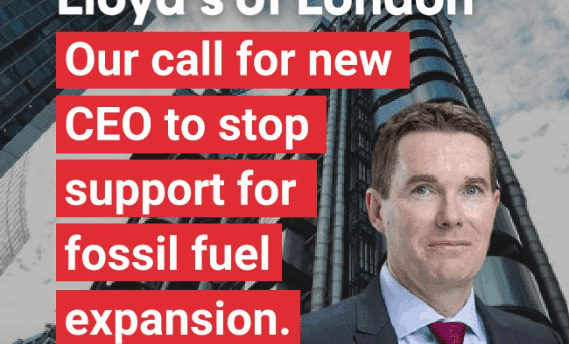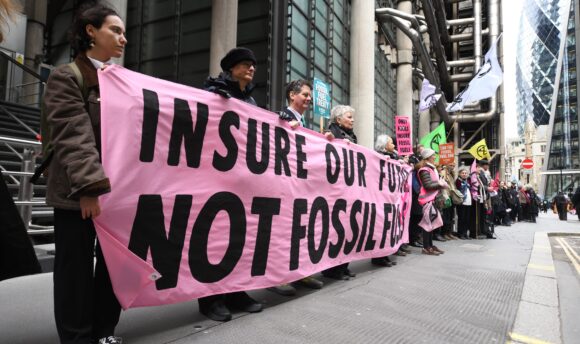Environmental organisations have written to Lloyd’s, the world’s oldest insurance company, calling for it to take action on risky coal business, in a letter released today.
Lloyd’s is preparing to exclude coal from its investment policy but NGOs believe that there is more the insurer could do to take action on the risks of coal.
ClientEarth and other environmental organisations engaged in the Insure Our Future campaign have asked the iconic insurance institution to adopt an investment policy which is consistent with industry best practice, and go further to protect insurers operating in the Lloyd’s market from the risks of coal business by requiring them to take greater precautions before insuring and investing in coal.
In February 2017, a report published by Lloyd’s found that coal-fired power needs to be phased out completely by the middle of the century for the planet to remain within a 2 degrees Celsius carbon budget, in line with the Paris Agreement. Keeping to the commitments made in Paris in 2015 will mean that more than half of all coal reserves cannot be burnt, rendering these assets unusable, unprofitable and stranded.
Lloyd’s doesn’t insure risks directly but oversees a market place for specialty insurers underwriting risks around the world. In a letter to Lloyd’s CEO Inga Beale, ClientEarth pointed out that Lloyd’s proposed investment policy change will affect just 2.5% of the capital supporting the business insured at Lloyd’s.
The letter warns that, without further action, a very large part of this capital “remains potentially exposed to coal related risks, such as stranded asset risk, through both the underwriting and investment in coal business”.
The ClientEarth letter recommends that Lloyd’s address the stranded asset risks of the activities on its market by amending the rules which all insurers who are members of the Lloyd’s market must comply with (the Minimum Standards). In line with the recommendations of Lloyd’s 2017 report on stranded assets, ClientEarth proposes that Lloyd’s:
- Ensure that insurers operating in its market stress test coal and coal-related operations to identify stranded asset risks;
- Require the use of current and peer reviewed climate science in the evaluation of stranded asset risks;
- Identify the recommendations of the Task Force on Climate Related Financial Disclosures as best industry practice in regards to how its Minimum Standards are applied.
"Coal operations have the potential to create outsized risks, consuming extensive amounts of capital to satisfy property losses, business losses and litigation exposuresLloyd’s has an opportunity to champion and consolidate the insurance industry’s view that underwriting and investing in coal is both risky and unprofitable.”
The preparation of a coal exclusion policy by Lloyd’s is part of a larger shift out of coal in the insurance industry. In November 2017 the Insure Our Future campaign found that 15 major insurers had divested an estimated $20 billion from the coal sector or were about to do so. AXA, SCOR and Zurich have taken additional steps to stop insuring coal projects, and Swiss Re has announced plans to do so.
In a separate letter, six environmental organisations engaged in the Insure Our Future campaign – ClientEarth, Greenpeace, InfluenceMap, ShareAction, the Sunrise Project and 350.org – encouraged Lloyd’s CEO Inga Beale to adopt best industry practices in the development of the company’s coal exclusion policy. Specifically, the organisations proposed, Lloyd’s should:
- Apply its exclusion policy not only to pure coal players, which make up a small portion of the global coal market, but to all companies which derive at least 30% of their business from coal;
- Extend its policy to cover extreme fossil fuels such as tar sands and Arctic oil drilling;
- Require the member companies of the Lloyd’s market to set aside more capital for any underwriting exposure to the coal sector.
By increasing the capital requirements for member companies offering insurance to the coal sector – a practice it has also applied for the exposure to cyber risks – Lloyd’s can appropriately account for the high risks of coal and encourage the transition from coal to clean energy sources. By doing so Lloyd’s can also avoid that the specialty insurers using its market place fill the gap left by other insurers which are currently leaving the coal sector.
"Lloyd’s move away from coal is highly symbolic for the demise of dirty fossil fuels. By adopting best industry practices in its coal exclusion policy, Lloyd’s can confirm its reputation as an environmentally responsible actor and avoid that its member companies undermine the shift of other insurers out of the coal sector.”
Lloyd’s is an insurance market located in London. Unlike most of its competitors, it is not an insurance company but a corporate body governed by the Lloyd’s Act of 1871 and subsequent Acts of Parliament. Lloyd’s operates as a marketplace within which multiple financial backers, grouped in syndicates, come together to pool and spread risk.



